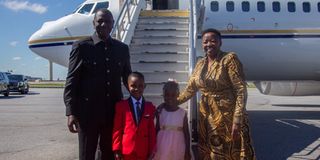Kenya’s US dilemma after 60 years of diplomatic ties

President William Ruto and First Lady Rachel Ruto pose for pictures on arrival at Hartsfield Jackson Atlanta International Airport in Atlanta on May 20, 2024.
What you need to know:
- As President William Ruto embarks on his trip to Washington, he faces major dilemmas in Kenya-US relations going forward.
- Among these are its commitment to its independence Pan Africanist ideals, maintaining its strategic autonomy while keeping its strategic ambiguity, avoiding entangling itself in a global environment of major power competition and avoiding a pro-western stance that encourages jihadist attacks on its territory.
Sixty years after formal diplomatic ties were established between Kenya and the United States, Kenya is faced with several dilemmas in its interaction with the global behemoth. Among these are its commitment to its independence Pan Africanist ideals, maintaining its strategic autonomy while keeping its strategic ambiguity, avoiding entangling itself in a global environment of major power competition and avoiding a pro-western stance that encourages jihadist attacks on its territory. As President William Ruto embarks on his trip to Washington, he faces major dilemmas in Kenya-US relations going forward.
Firstly, in regards to Kenya’s commitment to Pan-African ideals, Kenya's closeness to the US has created a major credibility gap. On continental matters, Kenya has signed onto bilateral agreements with the US that go against Pan-African interests and Africa’s Agenda 2063.
This credibility gap is made worse internationally by the perception Kenya is willing to become the errand boy for the expansion of American hegemony in faraway countries like Haiti, where Kenya has no national interest. The Ruto Administration’s closeness to the US on matters like police deployment to Haiti, reinforces the idea that the US is subcontracting the danger and potential loss of life in Haiti to Kenya, while keeping its military forces out of harms way.
With the police deployment to Haiti, Kenya appears as a benign tool in the advancement of American global interests. This does not grow Kenya’s Pan-African credentials.
Secondly, the other dilemma Kenya faces is maintaining its strategic autonomy while keeping its strategic ambiguity. Strategic autonomy to make decisions key to its national interests without being overly concerned with Washington’s reaction. Strategic ambiguity is lost as the US is easily aware of Kenya’s position on major global issues due to its closeness to the US and its isolation from alternative global powers.
Thirdly, Kenya’s closeness to the US, limits the country’s capacity to avoid entangling itself in rivalry between major powers on the global stage. At a minimum, other rivals of the US like China, Russia and Iran, that have traditionally had cordial relations with Nairobi, begin to question the intent of the Ruto Administration cosying to the US.
This has the potential of alienating Kenya from these nations that have been blacklisted by Washington. This also has the capacity of making the US the only game in town, which limits Kenya’s options in international relations.
Close association of Kenya to the US, exposes it to the wrath of jihadist networks and non-state actors. Related to entangling Kenya in major power rivalry, this also results in forcing Kenya to take positions on intractable issues like Israel's right to self-defense against Hamas in Gaza.
This highly controversial area of global conflict in the Middle East, exposes Kenya to attacks from jihadist terror networks and other non-state actors that want to punish the country for supporting the US. This happened during the US embassy attacks by Al Qaida in Nairobi in 1998 and the Al Shabaad attacks on Westgate, Dusit and numerous other locations seen as soft targets of US interests.
This is to say, Kenya suffers the blowback from the its close association with Washington in the view of America’s jihadist detractors.
Kenya’s US dilemma after 60 years of diplomatic ties lies in extracting the benefits of its alliance with a global power on one hand, while not getting entangled in expanding American global hegemony on the other. This dilemma is made harder given the asymmetrical relationship between both countries.
They are not equals in military, political, diplomatic, economic and cultural power. As a result, Kenya may be forced to selectively acquiesce to American interests on the continent to placate US demands in the years to come.
Professor Monda teaches political science, international relations, and foreign policy at the City University of New York. davidmonda.com. @dmonda1





